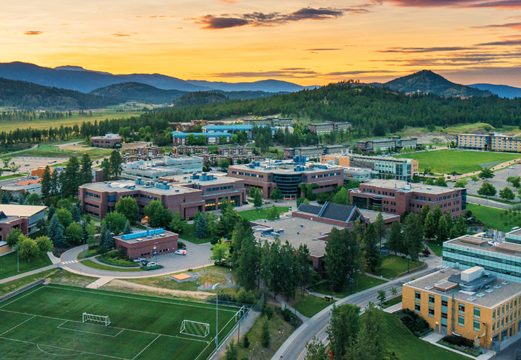Study what it means to be human in the broadest possible sense. Anthropologists are interested in the findings of all fields pertaining to humans and the processes of social and cultural life in human societies past and present, near and far. It connects the natural sciences, the social sciences, and the humanities. Cultural Anthropology is a main area of focus at UBC's Okanagan campus.
This program is also offered at UBC's Vancouver Campus
Find out moreProgram information
Send details- Campus: Okanagan
- Faculty: Irving K. Barber Faculty of Arts and Social Sciences
- Degree: Bachelor of Arts
- Length 4 yrs
- Co-op Yes
- Honours No
Anthropology is the study of what it means to be human and how cultural and biological issues affect humanity. This program connects the natural sciences, social sciences, and humanities in an integrated approach to studying past and present human societies. You can select a Major in Anthropological Archaeology, Biological Anthropology, Cultural Anthropology, or Linguistic Anthropology.
Experiential learning and research
You’ll have ample opportunities to get your hands dirty in Archaeology Field School, which includes reconnaissance survey, photography, mapping, excavation, and artifact analysis. Additional courses in archaeology offer local field trips, plus hands-on training in excavation techniques and interpretation.
The Anthropology department at UBC’s Okanagan campus is a world-leader in anthropological research of the South Pacific. In third year you’ll have the option of a directed-studies course, where you can conduct directed readings or a research project under the supervision of a faculty member. The Irving K. Barber Faculty of Arts and Social Sciences holds an annual undergraduate research conference on UBC’s Okanagan campus to showcase these student projects.
Join the Anthropology Student Union to connect with like-minded peers and receive help with your anthropological endeavours.
What you need to know
What can you do with this major after graduation?
Life at UBC's Okanagan campus
On UBC’s Okanagan campus, you'll gain all the benefits of attending a globally respected university while studying in a close-knit learning community. Modern on-campus residences are close to academic supports, and surrounded by hiking and biking trails, sandy beaches, and vast lakes. Take part in on-campus events, volunteer in the community, or explore the outdoors.
Find out moreYour future
A UBC education will introduce you to people and ideas from around the world, open doors to new opportunities, and take you places you never imagined.
You’ll graduate not only with expertise in your chosen field, but with the skills you need to continue growing, learning, and evolving with your career over time.
Program requirements
English-language requirements
English is the language of instruction at UBC. All prospective students must demonstrate English-language competency prior to admission. There are numerous ways to meet the English Language Admission Standard.
General admission requirements
IB Diploma Programme
- Completed IB Diploma, including at least three Higher Level courses.
IB Certificate Courses
- IB Certificate courses (Standard and Higher Level) may be used in an admissions average if you are graduating from a recognized high school curriculum that can be used as your basis of admission.
- IB Math Applications and Interpretations SL, or IB Math Studies, do not satisfy the math requirement for admission to UBC’s science-based programs, the Faculty of Management, the UBC Sauder School of Business, or the Vancouver School of Economics.
Degree-specific requirements: Arts
- No specific courses required beyond those needed for general admission
Related courses
The following subject categories are particularly relevant for this degree. Consider taking courses in these areas in your junior year and senior year.
- Language Arts
- Mathematics and Computation
- Second Languages
- Social Studies
- Visual and Performing Arts
